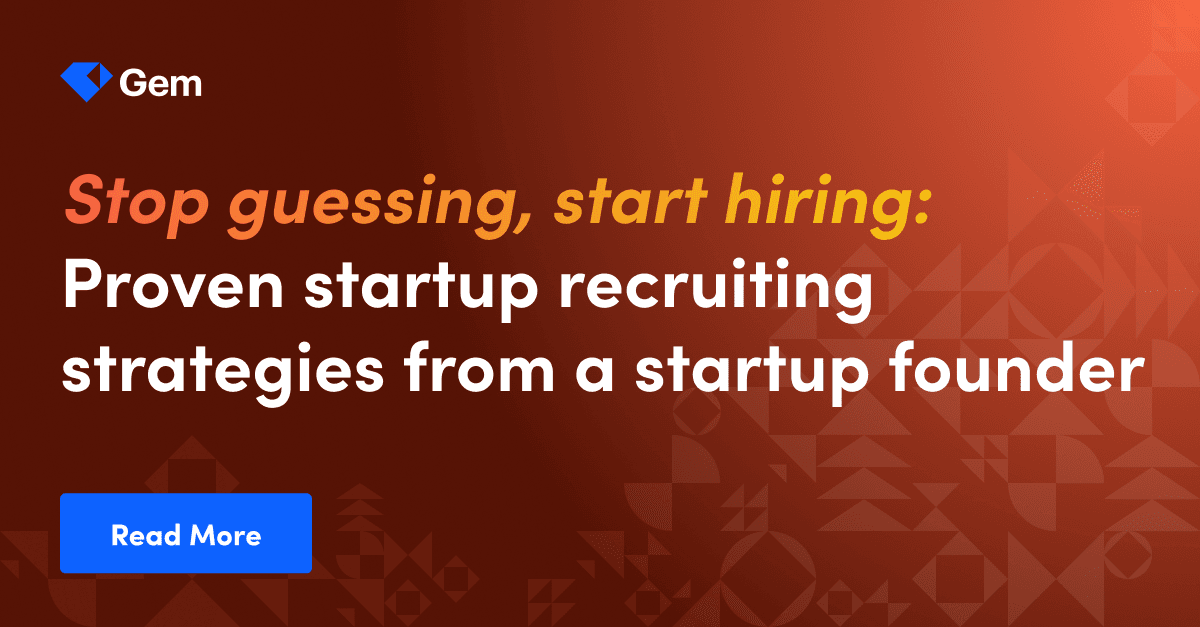Take a deep breath! You made it to our final installment, part 20, where we’ll cover how to close candidates at the offer stage and beyond.
Tactics for closing at the offer stage
It’s important to remember to always be to closing. This starts at the top of the funnel and should always be top of mind throughout the interview process.
As you get closer to making an offer, mistakes get costlier, and the stakes get higher. Also, the dynamic shifts after you make an offer, so it’s critical to understand whether the candidate is ready to receive one. Once you’ve made an offer, get creative, and involve the entire team.
Understand whether your candidate is ready
Before making an offer, it’s important to understand whether the candidate is ready for one. If there are big question marks in the candidate’s mind, address those first before making an offer. This is the single biggest mistake I see founders make with closing. We agonize so much over whether someone’s the right fit for our startup and forget candidates are agonizing over our opportunity just as much, if not more.
In sales, this would be like negotiating terms before our prospect said they want to buy. Why is this bad? Just like in sales, as soon as you start to talk about dollars, it completely changes the conversation. Suddenly, it becomes tough to have an open conversation about other important dimensions.
Before making an offer, make sure you understand a few key things:
Will the candidate have any competing offers?
What’s their timing?
Do they have any reservations or concerns? Address these first.
Are there any obvious reasons why the candidate may not accept that they aren’t telling you? e.g., do they have a bonus or vesting where they need to stick around for a few more months?
Know these things. If you don’t, you’re flying blind.
As a litmus test of how ready a candidate may be, I like to use the 1-10 method. I’ll ask, “assuming we can iron out comp, on a scale of 1-10, how ready are you to accept an offer?”. The first few times, I heard many encouraging six and sevens and moved straight to offer. Literally, none of them accepted. Now, when I hear six or sevens, I know I have some ground to cover.
At the offer stage, anything less than a nine or ten means you have work to do.
The key is to ask follow-up questions to dig in. “What would it take to get you to an eight? A nine? A ten?”
The 1-10 technique can be a catch-all for things you didn’t discover initially or things that came up in the meantime.
Pre-offer checklist
Once you’re ready to make an offer, follow a basic pre-offer checklist:
Make sure you are 100% aligned on the role and title.
Know exactly how much cash/equity you plan to offer and how much wiggle room you have.
Have an email draft queued up and ready to send with the formal offer, so all you have to do is press send once you’ve presented it verbally.
Structuring an offer and negotiating compensation
Check out our dedicated guide to structuring an offer and negotiating compensation:
Presenting an offer
When presenting an offer, you’ll want to present a verbal offer before sending a written offer. Talking through your offer verbally gives your candidate a chance to ask questions and gives you a chance to offer additional context and read their reactions — in-person or over video is always best. Just like in sales, we always present pricing proposals in person or over video because watching body language is key. Are they smiling? Are they leaning forward? Are they excited?
Lead with transparency, especially when it comes to equity. Try to figure out how much they understand about equity.
Have they worked at a startup before? Do they understand how options work? Do they understand dilution? Liquidity? Do they understand 409A price vs. preferred price?
If they don’t have a great understanding of equity, you can educate, which builds trust.
If they’re savvy, a lack of transparency is fatal because the candidate may think you’re trying to hide something.
We recommend taking a transparent approach to all of closing though. Startups are risky, and you’re asking someone to put a lot of trust in you by joining your small startup. If you’re not willing to share “here are our biggest challenges,” “here are the milestones we need to hit to raise our next round,” “here’s our runway,” or if you’re dodgy about your revenue, you’ll lose credibility big time. The best people you want to work with will see right through it.
After presenting the offer, ask this simple question — “We’re all SUPER excited to work with you. Is there anything else we can do to get you onboard?” — sometimes, you get a simple answer and may even be able to close them on the spot (e.g., bumping their base by $5k or paying for an online course they want to take). If you don’t ask, you’ll never know.
After the offer
It’s all hands on deck, so involve the whole team:
Even if they didn’t chat 1-1 with your entire team, have everyone send them a congrats email.
Dinners are another great way for everyone on your team to get a touchpoint.
Consider sending them a card signed by the team.
At Gem, we send a video montage from different members of the team.
Lean on people outside of your team for external validation. Investors, board members, advisors, and even mutual friends can be a great way to offer an “outsider” perspective. I’m surprised at how few companies leverage their investors in this way. We offered a chat with our lead investor from Accel, Dan Levine, for everyone on our founding team. Dan still hops on calls with a ton of candidates (especially leadership hires). Good advisors and investors will be excited about this because helping you close your early team is one of the highest-impact things anyone can do.
You could even consider involving your customers. We had customers hop on calls with most of our early customer-facing roles and every leadership hire. Hearing their enthusiasm for your product and team will be contagious!
Get creative with your offer
At Gem, we always look for ways to get creative at the offer stage and move mountains to close. We’ve bought refundable plane/EDC tickets, introduced a candidate to the Silicon Valley producers, and even recorded an original Justin Beiber music video parody for a candidate when we discovered she enjoyed playing guitar and recording cover songs.
For example, we learned early on that one of our early engineering candidates really liked to travel hack, where you use points to fly first class around the world. We found out there was a certain airline he wanted to fly for a while, but could never use points, so we booked him a refundable first-class ticket to Paris to give him along with his offer letter.
He was blown away by the personal touch and came onboard. Guess what? He told all his smart engineering friends about this baller trip he took as part of signing with Gem and now have several more travel hacker friends that have joined since. This may sound extravagant, but we thought of it as a much more thoughtful version of a ~$5k signing bonus.
After they accept
Closing does not stop after your candidate signs. I’ve seen so many people reneg and fall out of the process after signing over the years — I’m never 100% confident until they start on day one.
Keep the momentum going:
One thing you can consider doing is ramping them up on low-urgency work. Nothing on the critical path because you don’t want to make it high-pressure.
Add them to All Hands, company offsites, and team meetings. Frame these as optional and give them a heads up that you’ll add them in case they can make it.
Have everyone on your team add them on LinkedIn.
Send a welcome gift or card if you haven’t already.
Schedule a coffee/lunch/dinner with them before their start date.
Navigating the close
Naturally, curveballs will come up in the close, such as competition, counteroffers, and exploding deadlines from other companies. It’s critical to know these things so that you can respond quickly.
Dealing with competition
Be sure to ask who they’re interviewing with. Ask early on and continue to check in throughout the process. Sometimes candidates aren’t comfortable sharing at first, so you can ask what types of opportunities they’re exploring.
Once you uncover competitive offers, ask how they’re thinking about their different options. Ask them to stack rank on the dimensions important to them.
Focus on the aspects of your opportunity that are unique and align best with what you know they value from your discovery call.
If you don’t know who they’re interviewing with or who they have offers from, you’re going to have a tough time knowing how to close.
Dealing with counter offers
Sometimes a candidate’s current company will counteroffer, which throws a big wrench in everything. The good news is you can follow a few simple steps to position yourself well before a counteroffer is made:
Candidates are less likely to renege on an offer once they officially sign, so get them to sign your offer before telling their employer.
Once they’ve signed, I always ask the candidate if they want some coaching on conversing with their current manager.
Still, counteroffers may happen. When they do, you need a playbook:
I like to lead in with the following question, “Sounds like they made a counteroffer. But why now? They clearly think you’re worth it, so why are they only offering to pay you fairly now?”
Counter-offers are typically a bandaid and rarely solve the root cause for why someone was looking to leave. Share the following statistic to pivot the conversation away from comp and back towards their original motivations — nine out of ten people who take counter-offers leave within a year.
After this, I always share our philosophy. We never counter. And hopefully, it gives you confidence when you join Gem, it’s going to be equitable, and no one’s making more than you because of something arbitrary like a counter.
Handling exploding deadlines
We typically avoid deadlines at Gem. Deadlines work in some cases, but not always. Senior candidates aren’t going to take the job because you give them an exploding offer. They know their worth, and they can find another job. We use deadlines when we have two front-runner candidates in the pipeline for a specialized role.
If you feel strongly you need to drive urgency, you can consider starting a clock with the candidate, but let them choose when to receive their offer. For example, “once we make an offer, you have X days to decide. We can make the offer whenever you’re ready, but we want to make sure that you’re in the right headspace to think about it beforehand.” This can also come back to the 1-10 scale.
What if the candidate has an exploding offer from another company?
It’s crucial to coach them on how to deal with it, including how to get their recruiter to push the deadline. I’m surprised at how few candidates know how to handle this, even experienced ones.
Try this talk track with your candidate, “If they really have your best interests in mind, they should be OK with pushing back the deadline. If not, you may want to think hard about whether they have your best interests in mind.”
Arm your candidate with talking points like, “I value my career, and I want the next company I work for to be my home for many years. This is a critical decision for me, so I need more time to think things through.”
If they have a tight deadline, map out the rest of the interview process ASAP, and tentatively schedule all of the next steps even if you don’t know the outcome of a debrief.
Closing thoughts
That was a lot to cover, but selling and closing are super important. In summary, here are a few of the most important do's and don'ts of closing:
Don't wait until the last minute to close - Don’t do this. It doesn’t feel genuine, and it’s not effective.
Don't give an offer without knowing whether the candidate is ready for it - While you might be tempted to, let the candidate start the clock and work on their timeline, not yours.
Do make your offers verbally or in-person - This gives your candidate a chance to ask questions and provides you a chance to offer additional context and read their reactions.
Do lead with transparency - If you’re not willing to talk openly about your startup and trust your candidate, how can you expect them to trust you and take a leap of faith by joining?
You did it! You’ve reached the end of our guide to startup hiring. I hope you were able to walk away with solid insights, learnings, and best practices directly from our experience assembling our awesome team at Gem. If you want to come back to anything, you can find all of our startup hiring posts on the Gem blog or check out the complete guide at www.startuphiring101.com
We created Gem specifically to streamline and simplify many of the issues discussed throughout this guide, and the entire platform is free for two years, so I encourage any startup to give Gem a shot. My hope is that Gem’s startup program and this guide can help our next generation of founders build great teams in the same way that we built our founding team at Gem.
Thanks,
Steve Bartel
CEO and Founder of Gem
Share
Related posts

June 23, 2025
Stop guessing, start hiring: Proven startup recruiting strategies from a startup founder

June 13, 2025
Building TA operations that scale to 10,000+ employees

June 6, 2025
Scaling Talent Acquisition from 1,000 to 10,000 employees
Your resource for all-things recruiting
Looking for the latest data, insights, and best practices? Welcome to the Gem blog. We've got you covered.

